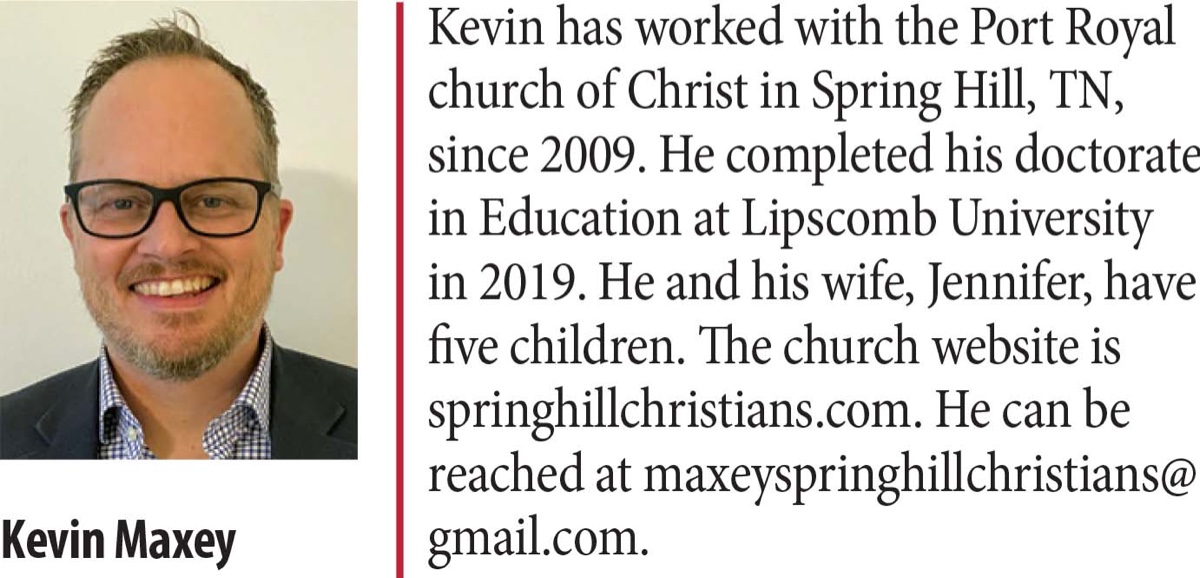by Kevin Maxey
Synopsis: God-centered education obeys Scripture, exposes folly, glorifies God, equips youth, inspires learning, and unites families.
As “progressive” leaders insist on removing God and biblical values from education, many concerned parents find it increasingly difficult to keep God central in their children’s education. How can Christians successfully educate and raise their children in “the training and admonition of the Lord” while living in an increasingly godless society (Eph. 6:4)? Is it possible for parents to equip children with righteous discernment in an academic culture that constantly blurs the line between good and evil (Heb. 5:14; Isa. 5:20)? Whether your children are public-, private-, or home-schooled, sobering challenges abound.
The goal of this special issue is to encourage parents to strengthen their commitment to God-centered education.
Three education models are relevant to this issue: (1) the “no-God” model, (2) the “some-God” model, and (3) the “all-God” model. The “no-God” model is man-centered, denigrating God from all subjects. The “some-God” model is multi-centered, segregating God from all other subjects. This model includes the study of God in education, but considers God separately from math, history, science, etc. The “all-God” model is God-centered, integrating God within and throughout all subjects.
Many good religious parents follow the “some-God” education model. This typically looks like students having a math class, a science class, a history class, etc., followed by a separate Bible class in a private religious school, home, or church setting. While all Bible study is certainly beneficial, carefully consider the significant advantages of implementing an assimilative God-centered approach to education. This theocentric approach incorporates God inside and throughout every subject of learning. God-centered education enriches both the heart and mind when students find God in every subject. God promises, “Those who seek me diligently will find me” (Prov. 8:17). This special issue will show how students can find God in math, science, history, language, and music.
Consider the following benefits of a God-centered education:
Moses commands parents to integrate divine instruction throughout all walks of life: “You shall teach them diligently to your children, and shall talk of them when you sit in your house, when you walk by the way, when you lie down, and when you rise up. . . You shall write them on the doorposts of your house and on your gates” (Deut. 6:7-9). David directs our ears to hear the ever-present theological instruction of the universe: “The heavens declare the glory of God; and the firmament shows His handiwork. Day unto day utters speech, and night unto night reveals knowledge. There is no speech nor language where their voice is not heard” (Ps. 19:1-3). Paul asserts that God revealed Himself in nature, explaining, “For since the creation of the world His invisible attributes are clearly seen, being understood by the things that are made, even His eternal power and Godhead, so that they are without excuse” (Rom. 1:20; Col. 2:2-3). The study of God must not be limited and segregated. Open your eyes and see the universe as God’s classroom.
Proud godless educators ironically deny the source from which their own education originates. The created foolishly rejects the Creator. “Even the stork in the heavens knows her times, and the turtledove, swallow, and crane keep the time of their coming, but my people know not the rules of the Lord” (Jer. 8:7). Animals have more understanding than the fool. “The ox knows its owner, and the donkey its master’s crib, but Israel does not know, my people do not understand” (Isa. 1:2-3). Even “dumb” donkeys know who their master is.
History repeatedly shows that the pursuit of education without God is doomed to fail. The wise men of Egypt, Babylon, Greece, and Rome were unable to prevent their nation’s demise (Ps. 9:17; Exod. 8:18-19; Dan. 2:27). “Professing to be wise, they became fools” (Rom. 1:22). Knowledge acquisition without God is an empty pursuit (Eccl. 2:12-17). In 2012, Harvard’s student newspaper, The Red Crimson, reported that suicide rates for Harvard University undergraduate students over a five-year period were nearly twice the national college student average. Additionally, when including students who committed suicide during leaves of absence, that rate doubled again. “Where is the wise? Where is the scribe? Where is the disputer of this age? Has not God made foolish the wisdom of this world?” (1 Cor. 1:20). Christ-like parents, be on guard. “See to it that no one takes you captive by philosophy and empty deceit” (Col. 2:8).
Man is not the source of knowledge acquisition and wisdom creation. “The fear of the Lord is the beginning of knowledge” (Prov. 1:7; 9:10). Wisdom existed prior to man’s creation. In the beginning, John proclaims, was the Logos; the same Logos who spoke the universe into existence, took on flesh, and dwelt among men (John 1:1, 14; Gen. 1:1-3ff). “By the word of the Lord the heavens were made, and by the breath of His mouth all their host. . . For He spoke, and it came to be; He commanded, and it stood firm” (Ps. 33:6, 9). Solomon affirmed, “The Lord by wisdom founded the earth; by understanding He established the heavens; by His knowledge the depths were broken up, and clouds drop down the dew” (Prov. 3:19-20; 8:27). God-centered education teaches our children to understand that God is the sole source of wisdom in all areas of study. “For the Lord gives wisdom; from His mouth come knowledge and understanding” (Prov. 2:6). Again, “If any of you lacks wisdom, let him ask of God, who gives to all liberally and without reproach, and it will be given to him” (Jas. 1:5).
God placed Moses in the academic halls of Egypt, equipping him to lead Israel from slavery. “Moses was instructed in all the wisdom of the Egyptians, and he was mighty in his words and deeds” (Acts 7:22). Young Samuel was not reared in an intellectually passive environment. From a very young age, God educated Samuel to be a faithful priest, prophet, and judge (1 Sam. 2:26). Wise elite from Babylon took notice of the superior intellectual aptitude of young Daniel, Hananiah, Mishael, and Azariah. God made these faithful young students imperial advisors. They were “skillful in all wisdom, endowed with knowledge, understanding learning, and competent to stand in the king’s palace” (Dan. 1:3-5). Educated at the feet of Gamaliel (Acts 22:3), Paul’s diligence in study enabled him to reason adeptly with Jewish leaders, Roman rulers, and Greek philosophers. Even twelve-year-old Jesus modelled the importance of children increasing in wisdom: “Jesus increased in wisdom and in stature and in favor with God and man” (Luke 2:52).
Renown scientists like Copernicus, Kepler, Galileo, and Newton found God in their scientific discoveries. Galileo asserted, “The laws of nature are written by the hand of God in the language of mathematics.” Johannes Kepler proclaimed, “The chief aim of all investigations of the external world should be to discover the rational order and harmony which has been imposed on it by God.” Isaac Newton described God as a divine engineer who is “very well skilled in mechanics and geometry.”
God-centered education adds eternal purpose and meaning to all subjects. For example, math displays the order of God, science demonstrates the design of God, history points to the providence of God, language reflects the authority of God, and music reveals the beauty of God. God-centered education inspires students. A student may not like math, but when he sees God in math, he will learn to love math. A child may not enjoy science, but when she sees God in science, she will learn to love science.
Finally, parents must not confine their children’s education within the walls of the secular classroom. God-centered education, instead, unites families around the throne of God. God calls engaged parents to immerse their families’ daily walk and talk with divine instruction (Deut. 6:1-9). The reach of this theocentric education is multigenerational, reaching even to children’s children (Deut. 6:2). Abraham united his family with divine instruction, teaching “his children and his household after him to keep the way of the Lord by doing righteousness and justice” (Gen. 18:19). The study of God united Lois, Eunice, and Timothy around the throne of God (2 Tim. 1:5; 3:14-15). God-centered education enables the Lord to build the house (Ps. 127:1). All education becomes praise to the Creator, recognizing Him as the Source.
Satan understands the battle for the souls of men begins in the mind. Determine now to reclaim all education for the glory of God. “For the weapons of our warfare are not of the flesh but have divine power to destroy strongholds. We destroy arguments and every lofty opinion raised against the knowledge of God” (2 Cor. 10:4-6).
Hatoff, Quinn D. “Donning a Mask: Suicide at Harvard (Part 1 of 3).” The Harvard Crimson, December 10, 2012. https://www.thecrimson.com/article/2012/12/10/suicide-harvard-mental-health/.


